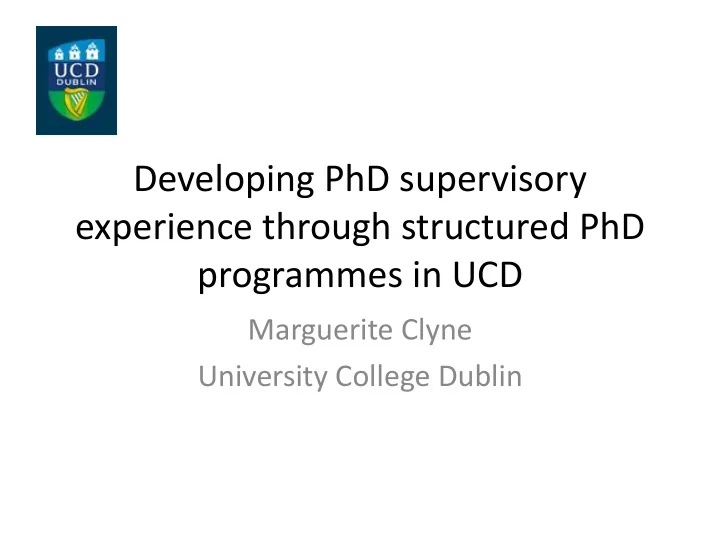

Developing PhD supervisory experience through structured PhD programmes in UCD Marguerite Clyne University College Dublin
Why do a PhD in Biomedical Science? • Biomedical Scientists are innovators • PhD degree is the gateway to a career in biomedical research • PhD is pathway to career in academia • 80% of PhD graduates pursue careers outside of academia such as business, industry and the public and voluntary sectors
What is doctoral research? The distinguishing feature of doctoral research is that it is original research , the outcome of which is an original and substantial addition to knowledge and understanding.
UCD PhD • UCD PhD is an award characterised by a significant original contribution to scholarship, based largely on a major research project • Doctoral students are expected to acquire a range of transferable skills, relevant to the successful completion of their research project and to their broader career development.
IUA Skills Statement • ethics and social responsibility, • communication skills, • personal effectiveness and development, • team working and leadership, • career management and • entrepreneurship and innovation.
What is a student supposed to be able to do when they finish their PhD?
PhD know-how and skill-range • Capable of being an independent investigator • Able to recognise and evaluate problems • Original autonomous thinking • Capacity for critical analysis, reflection and evaluation • Understanding and application of basic principles of project and time management, presentation skills and working in a collaborative environment • UCD PhD level descriptors
Why do we supervise research students? • Research students are the next generation of researchers. • They will become independent investigators • As academics working in universities our role as public servants is to nurture and support research students so that they can reach their full potential and contribute to society
The 10 Most Important Qualities of the Ideal Graduate Research Supervisor • Support • Availability • Interest and Enthusiasm • Knowledge and Expertise in the Field Surrounding the PhD • Interest in the Student's Career • Good Communication • Constructive Feedback • Provides Direction and Structure • Approachability and Rapport • Experience and Interest in Supervision https://www.otago.ac.nz/graduate- research/study/phddoctoral/programme/otago403801.html
Skill Set Required by PhD supervisor
Why do we refer to ourselves as supervisors? • Are we supervisors?
UCD Thematic PhD programmes in Biomedicine • Translational Medicine (School of Medicine) • Computational Infection Biology • Infection Biology • Bioinformatics • PhD students on these programmes benefit from advanced education, training and research focused on an identified theme. Students gain a deeper sense of community through shared seminars, taught modules and supervision.
UCD Structured PhD /www.ucd.ie/graduatestudies/forstaff/doctoralsupervision/structuredphd/
Modules available to students • Innovation and entrepreneurship • Statistics and data handling • Teaching in Higher Education • Research Ethics • Bioinformatics • Flow Cytometry • Imaging • Omics
Doctoral Studies Panel • The purpose of the Doctoral Studies Panel is to support and enhance the supervisor- student relationship, • to monitor the progress of the student through their doctoral studies, and to provide • advice and support to student and supervisor(s).
Membership of DSP and Meetings • DSP membership comprises of the research student, the Principal Supervisor and any second or additional supervisors, and two advisors. • Of the two nominated advisors – At least one will have academic expertise relevant to the student’s research work – At least one will have experience in supervising doctoral students to completion. • Students are required to meet with their DSP 3 times in stage 1. • Record DSP meetings using RPDP forms
Stage 1 • Stage 1 is an initial period of advanced education, training and research. • There are no restrictions on the relative proportion of taught modules, generic skills training, research training and original doctoral research within Stage 1 doctoral studies • You must complete 30 credits over the course of your PhD, level 4 or above from taught modules to graduate
What is purpose of stage 1 transfer assessment ? To assess the progress of the student and their competence and capacity to complete a doctorate at the end of Stage 1.
Stage 1 Assessment Panel Panel of three academic staff with sufficient expertise to assess you. The supervisor will not be there. Members of the DSP will not be there.
Criteria for assessment The criteria upon which candidates will be assessed are as follows 1. Are the aims of the project clear? 2. Has the student demonstrated an adequate understanding of knowledge in the field? 3. Is there evidence of sufficient progress? 4. Is there a clear research plan for the doctoral phase, with realistic timelines?
What the student has to do 1.Written Report (deadline for submission) 2.Supervisor report (deadline for submission) 3.Present for interview 4.Presentation 5.Answer questions
Report What goes in it? • Background • Hypothesis / Aims • Materials and Methods • Results (progress to date) • Plan for the doctoral phase • List modules completed • Signed DSP reports
Stage 2 of doctoral programme? Stage 2 is largely dedicated to original doctoral research (Level 5) but may also include advanced education and research and generic training. There is no restriction on the balance between these components except that the total awardable credit for education and training modules cannot exceed 90 credits. Interaction with the DSP in stage two is mandatory Especially recommended when the student is near completion of experimental work
Much of how we supervise is based on how we were supervised
Conclusions • A major benefit is a critical mass of supervisors that are supported. • Supervisors are prepared to evolve and are flexible in their approach to supervision. • Improved environment for the students; – Improves learning experience – Transferable skills make them attractive for future employers when they have finished their studies. • Need for rigorous assessment of supervisor development and survey of student satisfaction.
Recommend
More recommend